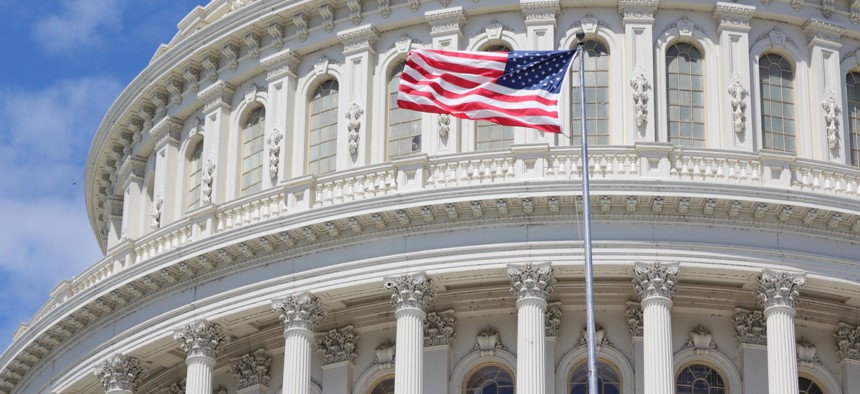3 Bills Focused on Securing Tech Superiority Over China

Tupungato/Shutterstock.com
Lawmakers aim to beef up the government’s tech prowess and put protections on American intellectual property and talent.
Bipartisan bills introduced in the House and Senate promote tech talent increases in the government ranks—especially the Defense Department—and call for more transparency among Chinese-funded investments and gifts made by China to U.S. academic institutions.
Artificial Intelligence for the Armed Forces Act
On Tuesday, Sens. Rob Portman, R-Ohio, and Martin Heinrich, D-N.M., introduced the AI for the Armed Forces Act. The bill further elevates the importance of AI across the Defense Department, ensuring the director of the Joint Artificial Intelligence Center is a three-star equivalent and reports directly to the defense secretary.
The bill would also require the defense secretary to “develop a training and certification program to better enable” the department’s human resources workforce to recruit AI and cybersecurity talent. Lastly, the bill calls for the defense secretary to issue guidance regarding how the Pentagon and sub-agencies could make better use of existing direct hire authorities to onboard AI talent.
National Security Innovation Pathway Act
Reps. Jim Langevin, D-RI, and Elise Stefanik, R-NY—the chair and ranking member of the House Committee on Armed Services subcommittee on Intelligence and Emerging Threats and Capabilities—introduced the National Security Innovation Pathway Act Wednesday.
The legislation aims to establish a pathway to an immigrant visa for non-citizens who engage in essential work to protect national security. It would provide an avenue for permanent residency for students or professionals engaged in specific technology fields, like AI, quantum information sciences, biology, robotics and hypersonics.
“The United States attracts some of the best minds to our universities and innovative companies and develops their expertise. Unfortunately, much of that talent leaves because there are few options to remain. This critical legislation to retain and leverage researchers and technologists will boost the innovation that backs our national defense efforts,” Langevin said in a statement.
The bill targets professionals in national security innovation, government-funded research at academic institutions and scientific or technical experts. Eric Schmidt, former chairman of Alphabet who now chairs the National Security Commission on Artificial Intelligence, endorsed the legislation Wednesday.
“It’s critical that our country remains competitive in the national security space. This bipartisan legislation will ensure the United States has the ability to provide a pathway for those who are able to fortify and bring further innovation to our national security strategy,” Stefanik said in a statement.
Safeguarding American Innovation Act
On Thursday, Sens. Portman and Tom Carper, D-Del., introduced the Safeguarding American Innovation Act, would call on the government to create a governmentwide database of federal grantees and standardize the grant application process. The legislation targets one of the ways China attempts to indirectly steal intellectual property from U.S. institutions—recruiting U.S.-based scientists and researchers to transfer U.S.-funded IP to China.
The bill further addresses the Education Department’s lack of enforcement on reporting foreign gifts from China to U.S. academic institutions. The Senate Permanent Subcommittee on Investigations, led by Portman and Carper, called out Education’s lax enforcement on such gifts in a February 2019 report.
Later in the year, Education opened investigations into two American universities—the Massachusetts Institute of Technology and the University of Maryland—regarding whether they had properly reported contacts with and gifts from foreign governments or tech-related entities.
Sens. Marco Rubio, R-Fla., Maggie Hassan, D-N.H., James Risch, R-Ind., Joe Manchin, D-W.V., Thom Tillis, R-N.C., Chris Coons, D-Del., Josh Hawley, R-Mo., Jeanne Shaheen, D-N.H., John Barrasso, R-Wyo., Catherine Cortez-Masto, D-N.V., Rick Scott, R-Fla., Mike Braun, R-Ind., and Marsha Blackburn, R-Tenn., have co-sponsored the bill.
According to a joint statement from Portman and Carper, the legislation would:
- Punish individuals who intentionally fail to disclose foreign support on federal grant applications, with penalties ranging from fines and imprisonment for not more than five years or both and a five-year prohibition on receiving a federal grant.
- Strengthen the Student and Exchange Visitor Program by requiring the State Department’s exchange program sponsors to have safeguards against unauthorized access to sensitive technologies and report to State if an exchange visitor will have access to sensitive technologies.
- Strengthen the State Department’s authority to deny visas to certain foreign nationals seeking access to sensitive technologies when it is contrary to U.S. national security and economic security interests of the United States.
- Mandate a standardized U.S. government grant process by authorizing the Office of Management and Budget to work with federal grant-making agencies to standardize the grant application process; share information about grantees; and create a U.S. government-wide database of federal grantees.
- Lower the reporting threshold for U.S. schools and universities receiving foreign gifts from $250,000 to $50,000 and giving the Department of Education authority to punish schools that fail to properly report.






